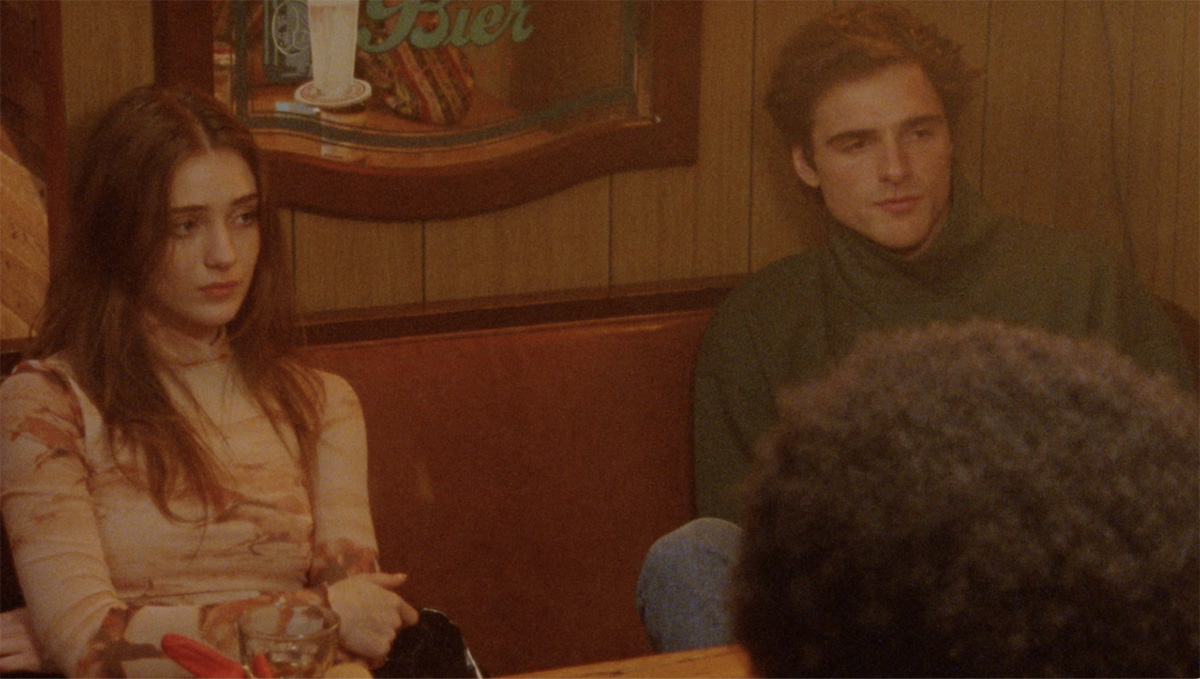Adventures Against Boredom: Nick Pinkerton on The Sweet East

Critics Campus 2023 participant Lauren Collee speaks to critic and The Sweet East screenwriter Nick Pinkerton about the film’s artistic priorities, literary inspirations and enigmatic protagonist.
How much can a viewer be expected to tolerate? It’s one of the questions that, according to screenwriter Nick Pinkerton, guided the production of The Sweet East (Sean Price Williams, 2023) – a picaresque comedy set in the modern-day USA that follows teenager Lillian (Talia Ryder) as she moves through the lives of various marginal characters and subcultures. The film is Pinkerton’s screenwriting debut; like its director, renowned cinematographer Williams, however, he is better known for other crafts – as a somewhat roguish film critic, with a popular newsletter and two decades of experience under his belt.
As a student, Pinkerton started out in a production program. “I got sidetracked into a critical career,” he explains. “The realistic possibility of being able to make a film did not seem open.” This changed in around 2015, when he was approached by Williams, a friend, with the idea of collaborating on a film. “This is one of the four screenplays that I wrote during a period of about as many years, and the only one to date that has actually been produced,” Pinkerton says. “The idea that I wasn’t just doing this to file something away in a cabinet somewhere – and that it seemed like there was some possible point of access that would allow it to come to fruition – was quite a prod.”
There are precedents for this career trajectory. Pinkerton cites French New Wave director Luc Moullet, another critic who turned to filmmaking. “In his work, the two things inform one another in a very profitable way. In the best of all possible worlds, I should like for that to be something that I can do. But it’s all very early in the process. And as to if this film will generate any real interest or open any doors would be purely speculative at this point.”
Is The Sweet East – with its Candide-like heroine, passing through door after door on her own quest through the United States to uncover the “best of all possible worlds” – something of an autobiographical portrait? There are parallels to be found between Lillian’s freewheeling journey and the role of the critic, who traverses various fictional realms as a witness, adjusting to the internal logic of each one. “I’m certain that there is at least a smidgen of myself in the movie,” Pinkerton responds, clarifying that the experiences don’t directly reflect his own. “More than anything else, I wanted the film to be something with reference to the actual world.”
True to this ambition, one of the film’s central characters is a Neo-Nazi named Lawrence (Simon Rex), a university professor who hides his white supremacist beliefs from his colleagues. “[When the screenplay was] written in early 2017, there was obviously a great deal of chitter-chatter about the renascent right, or the alt-right,” Pinkerton recalls. “But more than that, this was something that I had seen in a couple of people in my own life who had sort of drifted in that direction, and I wanted to unpack some of that. In one case, a very – in some regards – intelligent and sensitive person had gone down a certain rabbit hole that I found extremely sad.”

The Sweet East
Lillian, meanwhile, is a mirror onto which the other characters project their desires, pouring out their hearts and receiving somewhat inscrutable responses in return. In some ways, this is a fairly classical model – Pinkerton cites Charles Dickens’s Oliver Twist, Robert Bresson’s 1977 film The Devil, Probably and Carson McCullers’s 1940 novel The Heart Is a Lonely Hunter as other examples – but it wasn’t an easy movie to elevator pitch. “It is very long on bloviating monologues. To the lay reader, it’s a movie about guys running their mouths, and, at least in one case, a woman running her mouth.”
Having recently taken to browsing Letterboxd comments (an unfortunate habit, he says), Pinkerton has come across viewers who take exception in particular to the comparison to McCullers’s novel, in which a non-speaking deaf character named John Singer becomes the inscrutable confidante of four characters living in a mill town in 1930s Georgia, including a plucky and tomboyish teenage girl named Mick Kelly. They point out that Lillian is nothing like Mick, and that, unlike the latter, the film grants us no access to her inner world. But they’ve got it wrong, says Pinkerton – the counterpart to Lillian in the novel isn’t Mick, but Singer.
It was important that the film was “at least half about Lillian, and her listening – or not listening, or her kind of processing, or perhaps drifting off”, he adds. “If it’s not about Lillian’s responses, which are perhaps sometimes ambiguous, then we’ve not made the movie we set out to make.”
What would Lillian say if she were to have her own moment of divulging? It’s a scene that Pinkerton says he wrote, but then cut out. “I suppose it leaves the viewer with a little more work to do, or room to impose their own interpretation. I have mine.” As it is, Lillian’s “ambiguous” responses to surreal and sometimes extremely violent incidents are among the only clues we get to her character. But while he acknowledges she’s a “rather shifty” protagonist, he maintains that her indifference to tragedy is true of the experience of being young. “I mean, I can remember being 13 or 14 when the Oklahoma City bombing happened, or a senior in high school when the Columbine shootings happened. And, you know, maybe I’m just a completely broken lost soul, but it did not affect me the way that an event like that would have affected me five or 10 years later – in part because I just don’t think you’re really equipped to even understand the weight of that sort of thing, and that there is a kind of amoral giddiness that a lot of young people have, where it’s kind of exciting.”
Pinkerton’s take on the allure of youth certainly isn’t conventional, but his takes rarely are. He is wary of boredom – both his own, and that of his audience. “I think if I’m going to be of any use as a critic – or programmer, or whatever – that, above all else, kind of keeping myself jazzed about things is going to have to be part of that,” he says. “To allow myself to become a kind of collection of tics and observations repeated ad nauseam would be of little good to anyone – least of all the seventh art.”